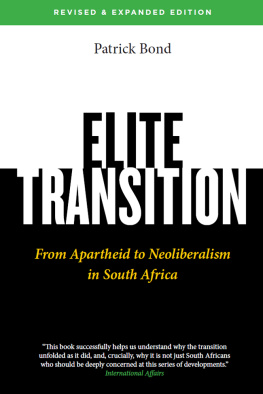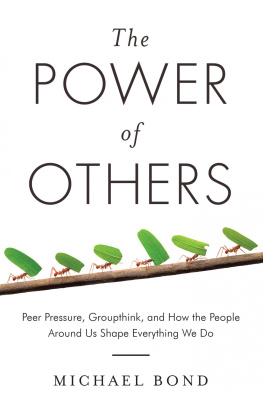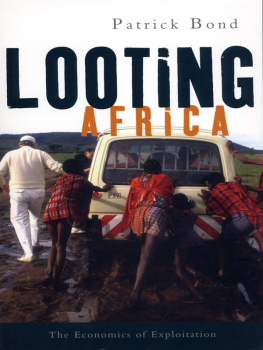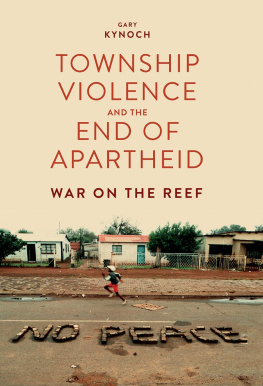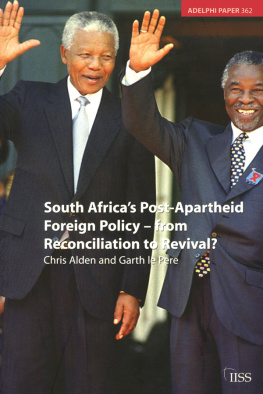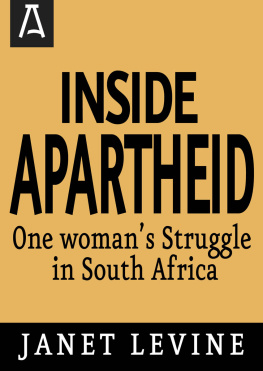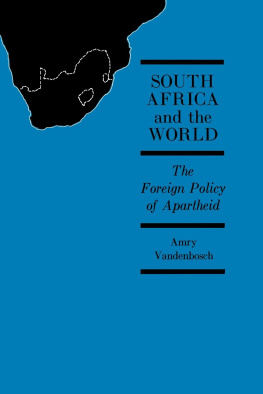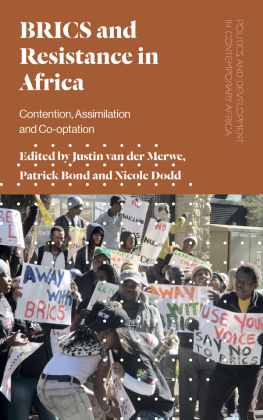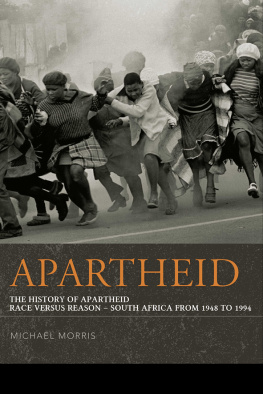Elite Transition
Elite Transition
From Apartheid to Neoliberalism
in South Africa
Revised & Expanded Edition
Patrick Bond
First published 2000 by Pluto Press
345 Archway Road, London N6 5AA
This revised and expanded edition published 2014
www.plutobooks.com
Copyright Patrick Bond 2000, 2005, 2014
The right of Patrick Bond to be identified as the author of this work has been asserted by him in accordance with the Copyright, Designs and Patents Act 1988.
British Library Cataloguing in Publication Data
A catalogue record for this book is available from the British Library
ISBN 978 0 7453 3478 3 Hardback
ISBN 978 0 7453 3477 6 Paperback
ISBN 978 1 7837 1144 4 PDF eBook
ISBN 978 1 7837 1146 8 Kindle eBook
ISBN 978 1 7837 1145 1 EPUB eBook
Library of Congress Cataloging in Publication Data applied for
This book is printed on paper suitable for recycling and made from fully managed and sustained forest sources. Logging, pulping and manufacturing processes are expected to conform to the environmental standards of the country of origin.
10987654321
Typeset from disk by Stanford DTP Services, Northampton, England
Text design by Melanie Patrick
Simultaneously printed digitally by CPI Antony Rowe, Chippenham, UK and Edwards Bros in the United States of America
Contents
List of Acronyms and Abbreviations
| ABSA | Amalgamated Banks of South Africa |
| AC | African Communist |
| ANC | African National Congress |
| BEE | Black Economic Empowerment |
| Cansa | Campaign Against Neoliberalism in South Africa |
| CBM | Consultative Business Movement |
| CBO | Community-Based Organisation |
| CIA | Central Intelligence Agency |
| CoNGO | Co-opted Non-Governmental Organisation |
| Cosatu | Congress of South African Trade Unions |
| DBSA | Development Bank of Southern Africa |
| DDA | Department of Development Aid |
| DEP | Department of Economic Planning (ANC) |
| Fabcos | Foundation for African Business and Consumer Services |
| FM | Financial Mail |
| Frelimo | Front for the Liberation of Mozambique |
| GATT | General Agreement on Tariffs and Trade |
| GDP | Gross Domestic Product |
| Gear | Growth, Employment and Redistribution |
| HIPC | Highly-Indebted Poor Countries |
| HSRC | Human Sciences Research Council |
| HWP | Housing White Paper |
| IDT | Independent Development Trust |
| IFC | International Finance Corporation |
| IFP | Inkatha Freedom Party |
| IMF | International Monetary Fund |
| Iscor | Iron and Steel Corporation |
| ISP | Industrial Strategy Project |
| JCI | Johannesburg Consolidated Investments |
| JSE | Johannesburg Stock Exchange |
| KP | Conservative Party |
| LAPC | Land and Agricultural Policy Centre |
| LGTA | Local Government Transition Act |
| LTCM | Long-Term Capital Management |
| MDC | Movement for Democratic Change |
| MDM | Mass Democratic Movement |
| Merg | MacroEconomic Research Group |
| Nail | New African Investments Ltd |
| NEM | Normative Economic Model |
| NGDS | National Growth and Development Strategy |
| NGO | Non-Governmental Organisation |
| NHF | National Housing Forum |
| NIS | National Intelligence Service |
| NP | National Party |
| Numsa | National Union of Metalworkers (South Africa) |
| OECD | Organisation for Economic Cooperation and Development |
| PEP | Professional Economists Panel |
| PPT | Presidential Project Team (Umtata) |
| PR | Public Relations |
| R&D | Research and Development |
| RDP | Reconstruction and Development Programme |
| RDS | Rural Development Strategy |
| SAB | South African Breweries |
| SACP | South African Communist Party |
| SADC | Southern African Development Community |
| SAHT | South African Housing Trust |
| Sanco | South African National Civic Organisation |
| SANDF | South African National Defence Force |
| Sangoco | South African Non-Governmental Organisation Coalition |
| TAU | Transvaal Agricultural Union |
| TEC | Transitional Executive Committee |
| THEMBA | There Must Be an Alternative |
| TINA | There Is No Alternative |
| UDI | Unilateral Declaration of Independence (Rhodesia) |
| UDS | Urban Development Strategy |
| UF | Urban Foundation |
| UNCTAD | United Nations Conference on Trade and Development |
| UNDP | United Nations Development Programme |
| WTO | World Trade Organisation |
INTRODUCTION
Dissecting South Africas Transition
This book aims to fill some gaps in the literature about South Africas late twentieth-century democratisation. There is already an abundance of commentary on the years of liberation struggle and particularly on the period 199094 empiricist accounts, academic tomes, self-serving biographies and many more narratives have been and are being drafted about the power-sharing arrangements that followed the April 1994 election, as well as the record of the ANC in its first term.
Some of these have been penned by progressives and are generally critical of the course the transition has taken thus far. In the development of an extremely rich heritage of thinking and writing about change in South Africa, have the dozen or more serious commentaries from the Left missed or skimmed or perhaps de-emphasised anything that this work can augment?
I believe so, namely a radical analytic-theoretic framework and some of the most telling details that help explain the transition from a popular-nationalist anti-apartheid project to official neoliberalism by which is meant adherence to free market economic principles, bolstered by the narrowest practical definition of democracy (not the radical participatory project many ANC cadre had expected) over an extremely short period of time. It is sometimes remarked that the inexorable journey from a self-reliant, anti-imperialist political-economic philosophy to allegedly home-grown structural adjustment that took Zambian, Mozambican/Angolan and Zimbabwean nationalists 25, 15 and 10 years, respectively, was in South Africa achieved in less than five (indeed, two years, if one takes the Growth, Employment and Redistribution document as a marker).
Inexorable? It is important now, while memories are fresh, to begin to describe with as much candour as possible even at the risk of unabashed polemic the forces of both structure and agency that were central to this process. Historians with better documentation (and, as in other settings, retroactive kiss-and-tell accounts by spurned ministers and bureaucrats, perhaps) will have to fill in, more comprehensively and objectively, once a fully representative and verifiable sample of evidence is in the public domain. In the meantime, a key motivation is that the near-term future for South African progressive politics relies upon identifying what was actually feasible, which initiatives derailed, when and how alliances were made, which social forces (and individuals on occasion) hijacked the liberation vehicle, where change happened and where it didnt, and what kind of lessons might be learned for the next stage of struggle.

